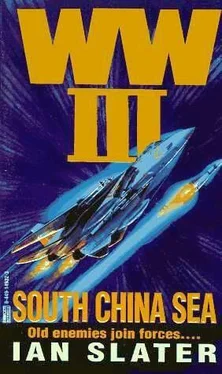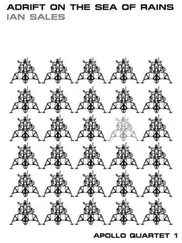“So,” the President said, leaning forward over the blotter, doodling and summarizing, “you all agree our policy should be as coherent in the South China Sea as it is in the Mideast. If you invade a neighbor, you’ll risk having the eagle swoop.”
“Especially,” Ellman added, “if you risk fouling up the sea routes and oil supply — in this case through the South China Sea.”
“Trust me,” the President assured them. “I won’t dodge the oil issue and dress it up as anything else — I’ll say unequivocally that the Western democracies need it, especially Japan and the U.S., and if the flow turns to a trickle, the eagle will more than swoop. At the same time, however, our intervention can’t be purely economic. We are, as the leading and most powerful democracy, going to put it on record that we are against the Communist invasion of one country by another. We’ve got to stabilize the region, goddamn it! We want a new world order, not more disorder.”
“Ironic, isn’t it,” Ellman commented, “that since the Berlin Wall came down, we end up having more wars around the world than ever before. I’m not saying we should go back to the bad old days of the cold war, but at least you knew the rules — this is our side, that’s your side, and don’t walk on the grass. Can you imagine that butchery in Rwanda in ‘ninety-four and ‘ninety-five happening if the Soviet Union had still been strong enough to exert its influence?” Ellman paused. “Still, if we put ourselves on record now as opposing the invasion of one country by another, we’ll be accused of assuming the role of the world’s policeman.”
“So be it,” the President said. “Besides, as you suggested, we don’t have to commit troops. Air and naval interdiction— cruise missiles included — would pack a sufficiently large wallop to disincline any would-be bullies on the block.”
“We’ll be called the bully,” Admiral Reese commented.
“Nevertheless,” the President said, “tonight I go on record by saying that we will not stand for any more Yugoslavias or Rwandas, and we can set up air and naval blockades. In any case, we won’t be impotent in the face of challenges to world peace.”
“A Pax Americana,” Noyer said. He, like Reese, wanted to know how far the President would be prepared to go.
“If you want to call it that — yes,” the President conceded. “Well, we sure as hell can’t leave it up to the Russians. And I don’t mean to exclude anyone who wishes to help, Lord knows. Canadian peacekeepers, British troops from Brunei, Australians perhaps, because of their interest in Southeast Asia.”
“I agree. The more the better,” Noyer said.
“And,” the President said, “if we can’t beat China’s veto on the Security Council, we could still rally a force of friends in the General Assembly so we’re not seen as acting just on our own convictions.”
“Where will Taiwan stand in this?” Admiral Reese asked. “It’s tended to favor a Beijing-Taipei fifty-one, forty-nine percent split on any oil and gas find in the South China Sea.”
“Taiwan’s a wild card in my view,” Ellman said. “It could go with us, but God help us if it goes with Beijing.”
The President was noticeably struck by the danger of this possibility. “Good God, we’ve equipped the Taiwanese.”
“We have,” Reese confirmed. “Ever since Truman and Cash My Check.”
Suddenly it seemed as if all the steam had gone out of the President’s stance of no exceptions to his idea of the rule of geopolitical stability. That is, if the Taiwanese joined China in the island dispute, it might very well bring the United States in against one of its oldest and staunchest allies. The President’s hands were clasped tightly, his skin blotching. “This is a decision, gentlemen, that Taipei’ll have to make. Is its potential oil split of fifty-one, forty-nine with Mainland China worth wiping out all its good relations with the U.S.?”
“But Mr. President,” Ellman began, “that’s a risk I wonder—”
“Yes, yes, I know, Bruce. It is something you would like to have an idea about first. All right, we’ll sound out the Taipei representative here right now. But the point I’m making is that my job and my intention is to lead this country, not to prevaricate, trying to court every single congressman over to our side. I want their support. I’ll ask for it, but in general terms. I’ll not plod through this one hoof at a time. If you do that you end up with a mishmash of conflicting policy statements.” He paused. “Look — over sixty-five American citizens have been murdered. Murdered! If we sit back and talk this one to death, how safe will any American feel anywhere around the world? No, I’ll go on TV tonight and tell the country I’m moving the Seventh Fleet into the South China Sea for possible interdiction pending the withdrawal of Chinese troops.”
Noyer waited till everyone else but he and the President had left the Oval Office. Then he said, “Mr. President, wouldn’t it be much easier for your just-stated policy if China didn’t come to the Security Council meeting you’ll be calling for in the speech? I mean, they’re sure to veto any criticism of themselves, let alone any action that might be taken against them.”
“Of course it would be better not having them there, but that’s highly unlikely.”
Noyer nodded. “Yes, it is. You’ve asked the Secretary General to call a meeting for nine a.m. tomorrow.”
“Yes — what are you suggesting? I change it?”
“Yes, Mr. President.”
The President sat back, surprised. “Earlier or later?”
“Later. Around four o’clock in the afternoon.”
“What on earth will that do to help us?”
“Probably nothing,” the CIA director conceded.
“Why four?” the President asked, intrigued.
“Four is a very unlucky number in Chinese. Nine is a very lucky one. Besides, four tomorrow afternoon instead of nine a.m. will give us more time—” Noyer paused. “—to prepare.”
The President eyed Noyer for a few moments before he spoke. “Ah… I don’t think you and I should say any more, do you?”
Noyer agreed and made for the door. “Good luck with your speech, Mr. President.”
Coughing relentlessly on his raft — or rather, the jagged-edged wood planking that had been part of the oil rig’s crew’s quarters — Danny Mellin was thanking God for the temperate water of the South China Sea. Perhaps if the plan of attack from the junk had a weak point, he thought, it was that the attackers had chosen dusk to make their move, which meant that if anyone else had survived the attack and the blast, then darkness might have prevented them from being picked off by the junk’s crew. Then again, darkness provided the junk with cover also, which was probably why they had decided on a dusk attack in the first place.
He had no doubt that the explosion would have been picked up by one of the microphones in the U.S. underwater sonar system. Hopefully, U.S. ships and/or subs of the Seventh Pacific Fleet had already been dispatched as fast as possible to investigate the massive explosion. Mellin could still see the smoky column that was, or rather had been, the joint Chical venture. But now it appeared to him not as a roaring inferno shooting hundreds of feet into the air like the Kuwaiti oil fires, but the size of a candle flame, the currents having moved him away from the coast and any immediate assistance.
After a while, in a wash of moonlight, Danny Mellin saw something in the water that he hoped he’d mistaken for the dorsal fin of a dolphin. Its ominous circling of his ever-weakening raft, however, suggested otherwise. Soon he saw a wave breaking on something that didn’t seem to move, and he guessed he was near a reef or one of the lonely islands that rose only a few feet out of the water and began to paddle toward it, the fin keeping up.
Читать дальше












